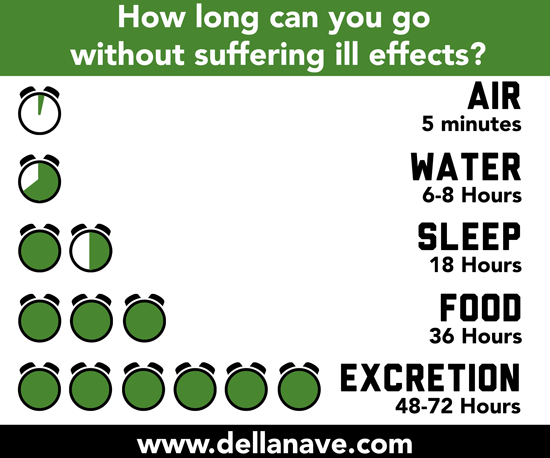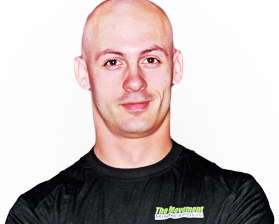
Sleep is the ultimate performance enhancing drug. If you could bottle up all the benefits of sleep in a side-effect free drug you’d have the first trillion dollar drug. Most people only get about four-fifths of the sleep they need. Which doesn’t sound so bad until you think about the chronic cumulative effects. What if your salary was cut by 20%? The immediate effects would be bad enough, but imagine what it would do to your retirement savings.
Lack of sleep can even affect your genetics. One recent study showed that people who slept for less than seven hours per night had an increased genetic risk for obesity. But how is this possible, aren’t your genes encoded at birth? Yes – and you can modify the interpretation of them with your lifestyle choices.

I protect my sleep fiercely. I’m not ashamed to admit that I’m a 9-10, sometimes 11 hours of sleep a night guy. Despite my best attempts I usually get to bed around 10, which means I’m usually up around 9. I take quick naps in the mid-afternoon often. While I’d love to be one of those people who can get away with 5-6 hours, I don’t think it’s ever going to happen for me, it’s just not in my genetics. But on the flip side, I reap the myriad benefits of all that sleep.
Sleeping better is accessible to almost everyone, but you’re going to have to do the fairly mundane work of basic sleep hygiene that you’ve been ignoring in the hopes of finding a sleep hack.
Environment
First let’s talk about your bedroom. You need a comfortable mattress. Sure you can buy one of those hip mattresses advertised on Facebook, but I think it’s worth taking it a step further considering you will literally spend a third of your life sleeping on it. Consider calling my friend Casey at Wildcat Mattress and telling him about your needs and preferences. Next you need to darken your room significantly. Buy room darkening roller blinds if you don’t already have blinds that block all outside light. They’re dirt cheap and incredibly effective. Finally, you need to be able to get your room down to a good sleeping temperature – between 60 and 68 degrees Fahrenheit. Depending on your situation getting an extra window unit or wall-mounted air conditioner might be the most efficient and effective way to do this. Our current house has central A/C but I still have a Haier ultra-quiet window unit because it’s both more effective and more efficient than trying to chill my entire house down to 60º. Temperature, light, mattress – fix these things.
Habits
Next you need to address the behavioral habits surrounding your sleep. If you watch TV or use electronics immediately before going to bed, you should probably stop. Research has shown that the predominantly blue (in terms of spectrum) light emitted by modern electronics is double plus ungood for sleep and may in fact cause other pathologies including eye issues. Amber-tinted glasses can help with this. Big picture though, it’s also best to wind down before sleep in a more natural manner.
Getting to sleep before 10pm is ideal, as most people will experience a bump in cortisol levels around that time if they’re not asleep yet – experienced as the well-known “second wind” you get late at night. This cortisol coming at the wrong time could be the cause of many downstream deleterious effects.
You’ll have to experiment and figure out for yourself if caffeine late in the day (or at any time of day) is a problem for your own sleep cycle. Between self-experimentation confirmed by genetic testing I know that I’m a caffeine “fast metabolizer” and it doesn’t affect me negatively if I have caffeine even as late after dinner. Your mileage might vary, and you might have to cut it out after noon.
Apps
Most (all?) sleep apps don’t truly measure your sleep, they sort of approximate it based on things that are easier to measure like how much you’re moving. Zeo was a company that actually measured your brain signals, but unfortunately they failed. BUT, I still think it’s worth using a sleep monitor app, even one as simple as Sleep Cycle because it brings your focus and attention to improving your sleep. It can also help you sort out variables that affect your sleep – such as when you’ve had caffeine or worked out.
Talk to Your Doc
If you’re more than 50 pounds overweight and/or snore significantly you should strongly consider asking your doctor for a sleep study. If you need a CPAP you’re probably not going to sleep well without one, so get it checked out.
Supplements
There are some supplements that can help with sleep. ZMA is one that could be beneficial, is pretty cheap, and is unlikely to have any ill effects. Melatonin is the most popular sleep supplement, and it’s worth experimenting with but you can become dependent on it so it’s best to back it out once you’ve normalized your sleep rhythm. Plus, supplementing with melatonin doesn’t do any good if you’re not covering the other basics first, and in fact it can totally backfire.
Ultimately, these steps are mundane. You’ve probably heard them before. If you were hoping for some sleep hacks you are disappointed. The good news is that means you haven’t done moved the simple and effective big rocks to improve your sleep, and you still stand to gain from the most effective actions.


Leave a Reply